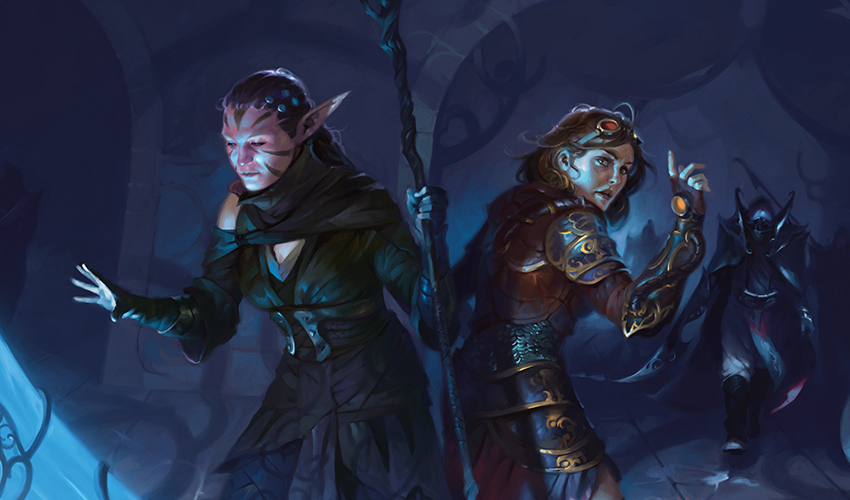Wizards of the Coast (WoTC), publisher of the popular collectible card game Magic: The Gathering, issued an apology to its fans on Friday. Some fans were upset after the publication of the tie-in novel War of the Spark: Forsaken appeared to erase the sexual identity of planeswalker Chandra Nalaar. “Over the past week, we have seen and heard strong reactions from fans about how we handled the resolution of the Nissa-Chandra romantic relationship in the recent Forsaken novel, and we apologize,” WoTC said in its statement. “We didn't live up to the expectations we created for Chandra and what she means to our fans.”
Magic: The Gathering started as a collectible card game but it’s grown into much more. In addition to the card game, there’s the digital Arena, dozens of comics and novels, and an upcoming Netflix show created by the Russo Brothers—the filmmakers who directed Avengers: Infinity and Endgame. Magic is big business and its fans are loyal.
Magic: The Gathering’s story, such as it is, has always been loose. But since 2015, WoTC has been trying to codify something like a grand narrative centered around Planeswalkers—powerful spellcasters who travel Magic’s multiverse. Chandra is a Planeswalker who wields flame and, in the early novels, is portrayed as queer, developing feelings for the Elven Planeswalker Nissa.
Though never explicitly stated in the published novels and short stories, Nissa and Chandra’s relationship was heavily implied and teased. Fans argued about the exact nature of the relationship, with some believing it was obviously a romantic connection and others believing they were just friends. Fans even asked WoTC outright what was going on between the pair, to which Head of Story Mark Kelman said, “read the next book.”

That book is War of the Spark: Forsaken and fans haven’t taken it well. In the novel, it is explained that Chandra isn’t queer at all, and the prose makes it feel like WoTC is running in the opposite direction from the implications it set up. “On Ravnica, in the wake of Gideon’s death and Bolas’, they had admitted to each other that they loved. But both of them knew deep down they were only speaking platonically.”
Chandra had never been into girls. Her crushes—and she’d had her fair share—were mostly the brawny (and decidedly male) types like Gids. But there had always been something about Nissa Revane specifically, something the two of them shared in that great chemical mix—arcing between them like one of Ral Zarek’s lightning bolts—that had thrilled her. From the moment they first met.
Now everything’s different.
It was over. Before it had ever had a chance to begin. Maybe, maybe they had missed their moment.
Reaction to the book has been mostly disgust.
WoTC issued its apology on November 22, 10 days after the book’s publication, and reaffirmed Chandra’s queer identity. “Chandra will love and be involved with many characters as her story unfolds—regardless of gender,” WoTC said. “She will explore her relationships with fire and passion as she adventures across the multiverse. She is the character you've come to know and see yourself, your friends, and your family in over the past decade.”
When it comes to its fans beyond cis heterosexual men, it often feels like Magic is taking one step forward and two steps back. If it seems like fans are defensive and on the lookout for bullshit from WoTC, it’s because they’ve fought hard to get to the nominal level of recognition and acceptance they currently have within their own hobby.
Women and members of the LGTBQ community have long felt like outsiders in the community. The tournament scene is notoriously toxic and players and commentators have been banned for making threats against female competitors and cosplayers. The game’s design team has always been overwhelmingly male. In 2015, Magic’s head designer Mark Rosewater was asking the community why more women didn’t attend tournaments. When player Jessica Estephan became the first woman to win a Grand Prix—one of Magic’s largest and longest running tournament events—in 2018, the social media backlash was so intense she had panic attacks.
In March, WoTC removed pro-player Owen Turtenwald from its Mythic tournament—an invite only event where the best players in the game compete for millions of dollars. WoTC never officially explained why it removed Turtenwald, but several women stepped forward to explain how he’d sexually harassed them and abused his position as a Magic pro. In March, WoTC replaced Turtenwald with a non-binary player, Autumn Burchett.
Burchett used their position in the spotlight to highlight and criticize a trans-exclusionary artist who has worked on Magic art. They erased the artist’s name on several land card and wrote “trans rights are human rights,” and “no TERFs on Gruul Turf” across cards she played with in a tournament—referencing the common acronym for Trans Exclusionary Radical Feminists. Tournament rules allow players to use cards that have been signed, but asked Burchett to pull their cards. Not because they were upset about the slogan, but because erasing the artist’s name would violate WoTC’s contract with the artist. In the end, WoTC allowed Burchett to write the slogan on other land cards and proceed to play while still making a political statement.
This is the freighted history of representation and inclusion around Magic, and it's a history that raises the stakes for things like licensed novels. Especially because, as works of fiction, novels are a place where Wizards of the Coast could make clear that within the world of Magic, queer people exist, and can be the stars of the story. That's a direction the story seemed to be going, and it's an opportunity that this most recent novel appeared to squander and dismiss, much as queer Magic players and fans have been dismissed and discriminated against.
from VICE https://ift.tt/35DNE6K
via cheap web hosting
No comments:
Post a Comment